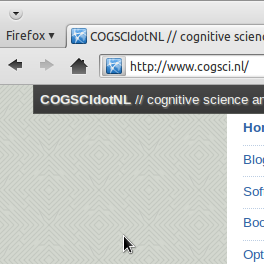Do you remember what it was like before the Internet? If not, just Google “what was it like before the internet?” and you will.
In a recent study in Science, Sparrow and colleagues investigated whether people indeed use the Internet as an external memory store. This idea is not entirely new (in fact, it may be kind of obvious that, in some sense at least, we do), but their experiments are quite nice.
 The first experiment is most compelling, so I will give you a few
details. Participants were asked questions that were either easy or
difficult. After a series of questions, all of approximately the same
difficulty, participants performed a Stroop-like task. In this task,
participants had to name the colors of words. Like this:
The first experiment is most compelling, so I will give you a few
details. Participants were asked questions that were either easy or
difficult. After a series of questions, all of approximately the same
difficulty, participants performed a Stroop-like task. In this task,
participants had to name the colors of words. Like this:
Google Nike Yahoo Shell
So that would be “red, green, blue, red”. You get the point. The idea is that we are such overtrained readers that word-meaning is processed before color. If a word is particularly interesting, it will capture attention and interfere strongly with the color naming-task. As a result, the response is delayed for interesting words.
The crucial finding was that people are slower to name the color of computer-related words (such as Google), compared to control words (such as Nike), particularly after a series of difficult questions. The authors concluded from this that when we hear a difficult question, we don't think about the question per se, but about how we are going to find out the answer. Which is typically by doing an Internet search on a computer.
In two other experiments, Sparrow and colleagues showed that people are more likely to forget facts if they believe that these facts will be retrievable later on (e.g., when you can find it on Wikipedia). This probably applies to non-Internet situations as well (when you write something down, for example), but it's an interesting finding nevertheless.
They also found some evidence that people are better at remembering where facts are stored, than remembering the actual facts. This experiment was a bit weak though, in my opinion, since there were only a few possible “folders” where facts could be stored, whereas the facts themselves could be anything. So it's kind of like comparing multiple choice to open questions.
But, by and large, the study by Sparrow and colleagues elegantly shows how heavily we rely on external memory stores. Nowadays the Internet is, of course, our dominant source of information. Whether or not you agree with the authors' strong claim that “we are becoming symbiotic with our computer tools”, many of us would defintely be lost without the internet!
References
Sparrow, B., Liu, J., & Wegner, D. (2011). Google Effects on Memory: Cognitive Consequences of Having Information at Our Fingertips Science DOI: 10.1126/science.1207745